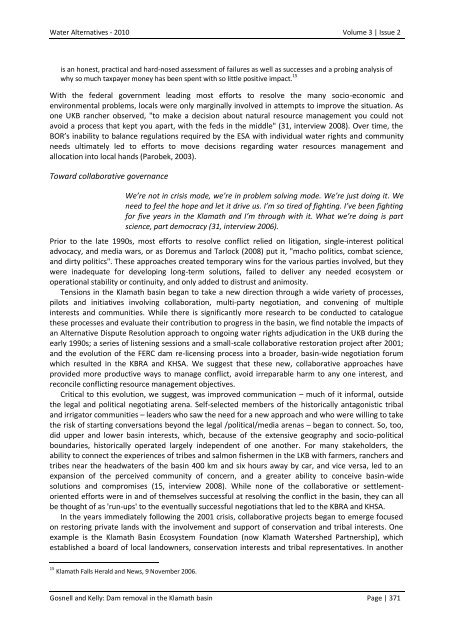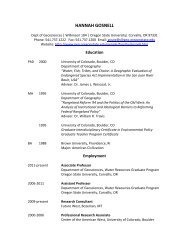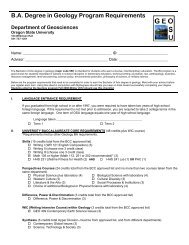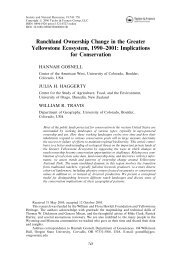Peace on the River? Social-Ecological ... - Water Alternatives
Peace on the River? Social-Ecological ... - Water Alternatives
Peace on the River? Social-Ecological ... - Water Alternatives
You also want an ePaper? Increase the reach of your titles
YUMPU automatically turns print PDFs into web optimized ePapers that Google loves.
<strong>Water</strong> <strong>Alternatives</strong> - 2010 Volume 3 | Issue 2<br />
is an h<strong>on</strong>est, practical and hard-nosed assessment of failures as well as successes and a probing analysis of<br />
why so much taxpayer m<strong>on</strong>ey has been spent with so little positive impact. 15<br />
With <strong>the</strong> federal government leading most efforts to resolve <strong>the</strong> many socio-ec<strong>on</strong>omic and<br />
envir<strong>on</strong>mental problems, locals were <strong>on</strong>ly marginally involved in attempts to improve <strong>the</strong> situati<strong>on</strong>. As<br />
<strong>on</strong>e UKB rancher observed, "to make a decisi<strong>on</strong> about natural resource management you could not<br />
avoid a process that kept you apart, with <strong>the</strong> feds in <strong>the</strong> middle" (31, interview 2008). Over time, <strong>the</strong><br />
BOR’s inability to balance regulati<strong>on</strong>s required by <strong>the</strong> ESA with individual water rights and community<br />
needs ultimately led to efforts to move decisi<strong>on</strong>s regarding water resources management and<br />
allocati<strong>on</strong> into local hands (Parobek, 2003).<br />
Toward collaborative governance<br />
We’re not in crisis mode, we’re in problem solving mode. We’re just doing it. We<br />
need to feel <strong>the</strong> hope and let it drive us. I’m so tired of fighting. I’ve been fighting<br />
for five years in <strong>the</strong> Klamath and I’m through with it. What we’re doing is part<br />
science, part democracy (31, interview 2006).<br />
Prior to <strong>the</strong> late 1990s, most efforts to resolve c<strong>on</strong>flict relied <strong>on</strong> litigati<strong>on</strong>, single-interest political<br />
advocacy, and media wars, or as Doremus and Tarlock (2008) put it, "macho politics, combat science,<br />
and dirty politics". These approaches created temporary wins for <strong>the</strong> various parties involved, but <strong>the</strong>y<br />
were inadequate for developing l<strong>on</strong>g-term soluti<strong>on</strong>s, failed to deliver any needed ecosystem or<br />
operati<strong>on</strong>al stability or c<strong>on</strong>tinuity, and <strong>on</strong>ly added to distrust and animosity.<br />
Tensi<strong>on</strong>s in <strong>the</strong> Klamath basin began to take a new directi<strong>on</strong> through a wide variety of processes,<br />
pilots and initiatives involving collaborati<strong>on</strong>, multi-party negotiati<strong>on</strong>, and c<strong>on</strong>vening of multiple<br />
interests and communities. While <strong>the</strong>re is significantly more research to be c<strong>on</strong>ducted to catalogue<br />
<strong>the</strong>se processes and evaluate <strong>the</strong>ir c<strong>on</strong>tributi<strong>on</strong> to progress in <strong>the</strong> basin, we find notable <strong>the</strong> impacts of<br />
an Alternative Dispute Resoluti<strong>on</strong> approach to <strong>on</strong>going water rights adjudicati<strong>on</strong> in <strong>the</strong> UKB during <strong>the</strong><br />
early 1990s; a series of listening sessi<strong>on</strong>s and a small-scale collaborative restorati<strong>on</strong> project after 2001;<br />
and <strong>the</strong> evoluti<strong>on</strong> of <strong>the</strong> FERC dam re-licensing process into a broader, basin-wide negotiati<strong>on</strong> forum<br />
which resulted in <strong>the</strong> KBRA and KHSA. We suggest that <strong>the</strong>se new, collaborative approaches have<br />
provided more productive ways to manage c<strong>on</strong>flict, avoid irreparable harm to any <strong>on</strong>e interest, and<br />
rec<strong>on</strong>cile c<strong>on</strong>flicting resource management objectives.<br />
Critical to this evoluti<strong>on</strong>, we suggest, was improved communicati<strong>on</strong> – much of it informal, outside<br />
<strong>the</strong> legal and political negotiating arena. Self-selected members of <strong>the</strong> historically antag<strong>on</strong>istic tribal<br />
and irrigator communities – leaders who saw <strong>the</strong> need for a new approach and who were willing to take<br />
<strong>the</strong> risk of starting c<strong>on</strong>versati<strong>on</strong>s bey<strong>on</strong>d <strong>the</strong> legal /political/media arenas – began to c<strong>on</strong>nect. So, too,<br />
did upper and lower basin interests, which, because of <strong>the</strong> extensive geography and socio-political<br />
boundaries, historically operated largely independent of <strong>on</strong>e ano<strong>the</strong>r. For many stakeholders, <strong>the</strong><br />
ability to c<strong>on</strong>nect <strong>the</strong> experiences of tribes and salm<strong>on</strong> fishermen in <strong>the</strong> LKB with farmers, ranchers and<br />
tribes near <strong>the</strong> headwaters of <strong>the</strong> basin 400 km and six hours away by car, and vice versa, led to an<br />
expansi<strong>on</strong> of <strong>the</strong> perceived community of c<strong>on</strong>cern, and a greater ability to c<strong>on</strong>ceive basin-wide<br />
soluti<strong>on</strong>s and compromises (15, interview 2008). While n<strong>on</strong>e of <strong>the</strong> collaborative or settlementoriented<br />
efforts were in and of <strong>the</strong>mselves successful at resolving <strong>the</strong> c<strong>on</strong>flict in <strong>the</strong> basin, <strong>the</strong>y can all<br />
be thought of as 'run-ups' to <strong>the</strong> eventually successful negotiati<strong>on</strong>s that led to <strong>the</strong> KBRA and KHSA.<br />
In <strong>the</strong> years immediately following <strong>the</strong> 2001 crisis, collaborative projects began to emerge focused<br />
<strong>on</strong> restoring private lands with <strong>the</strong> involvement and support of c<strong>on</strong>servati<strong>on</strong> and tribal interests. One<br />
example is <strong>the</strong> Klamath Basin Ecosystem Foundati<strong>on</strong> (now Klamath <strong>Water</strong>shed Partnership), which<br />
established a board of local landowners, c<strong>on</strong>servati<strong>on</strong> interests and tribal representatives. In ano<strong>the</strong>r<br />
15 Klamath Falls Herald and News, 9 November 2006.<br />
Gosnell and Kelly: Dam removal in <strong>the</strong> Klamath basin Page | 371






